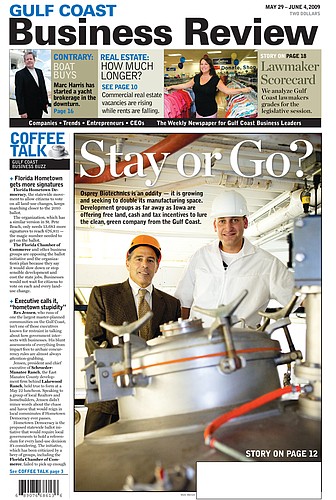- November 26, 2024
-
-
Loading

Loading

Vince Scuilla refuses to let the recession dampen the optimistic outlook for his company, which produces private-label lines of laboratory-made bacteria used primarily for wastewater treatment.
“You could sit back and say recession this and recession that,” says Scuilla, which is pronounced Shula. “Or you could look for areas where you can grow.”
Scuilla has followed that line to near-perfection lately. His company, Sarasota-based Osprey Biotechnics, is now planning to enter the research and development phase of a new market in 2010: Laboratory-made fungi to be sold as biological agents that can control weeds and wipe out pests and insects, including roaches.
The expansion includes opening a 20,000-square-foot laboratory, which the company plans to run as a separate business entity from its bacteria facility.
“So we'll have a two-pronged program — growing both beneficial microbes and fungi,” says Osprey Biotechnics Executive Vice President Lauren Danielson in a press release announcing the expansion plans. “And we expect the new fungal products to become as widespread as our helpful bacteria.”
Osprey Biotechnics was founded in 1990. The company's products can be used for a variety of wastewater-related tasks, including cleaning up marine spills, restaurant drains and industrial septic systems. Most of its products are made under private labels for other companies, such as CLR Septic System Cleaner, a well-known formula marketed and sold by national household cleaning firm Jelmar.
The company, which had about $10 million in 2008 revenues, outgrew its 27,000-square-foot facility early in 2009, Scuilla said in a May 28 Review story. And by late fall, the company had held several meetings with local economic development officials eager to assist the firm with its expansions plans in return for staying in the region.
Scuilla says he would like to see Osprey Biotechnics stay in Sarasota, although the company hadn't settled on an expansion site as of mid-November. The expansion into the new facility would mark the beginning of a five-year growth plan for the fungal side of the business, Scuilla says. That would include hiring new researchers and salespeople.
In addition to the laboratory project, Scuilla spent the last six months of 2009 developing plans for another type of expansion: Overseas sales.
The company has had minimal sales in Europe, totaling less than 1% of overall revenues over the past few years. But Scuilla says that's due more to a lack of trying hard than a lack of the right products. Says Scuilla: “We've never put an all-out effort into selling overseas.”
But Scuilla thinks Osprey Biotechnics' clean and green product approach should be a hit in trend-conscious countries such as England, Germany and Holland.
He hopes that Europe will represent 20% of the company's overall sales base within a few years.
— Mark Gordon